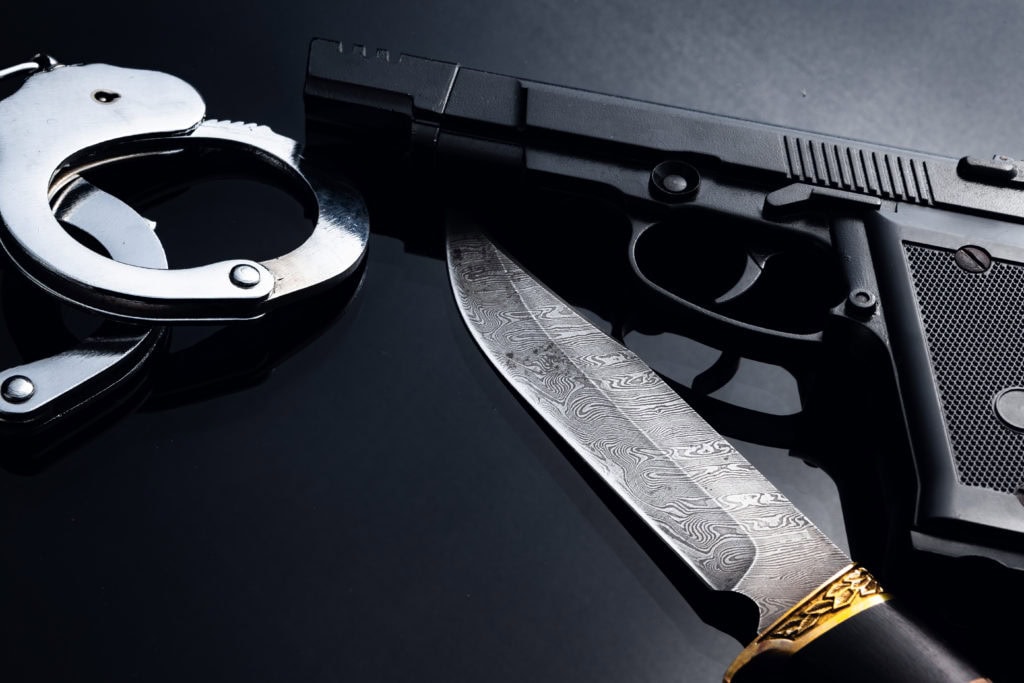Top Rated Criminal Lawyers | Call Us 24/7 AT (416) 658-1818

Section 88 of the Criminal Code makes it a criminal offence to carry a weapon for a purpose “dangerous to the public peace”. This section applies to weapons other than prohibited weapons. Prohibited weapons are those weapons, which are always illegal to possess.
Section 88 refers to weapons other than prohibited weapons, which are legal to possess, but illegal to carry if and only if you are carrying them for a purpose contrary to the public peace.
Just what does the Criminal Code mean by the word “weapon”? In s. 2 of the Code, “weapon” means “anything used, designed to be used or intended for use
(a) in causing death or injury to any person, or
(b) for the purpose of threatening or intimidating any person.”
This definition includes not only an object designed to cause harm to another person; but also any object that a person uses or intends to use to cause harm. A baseball bat, for example, is not designed to be a weapon, it is designed to use when playing baseball.
However, when an individual carries a baseball bat with the intention of using it to threaten or rob someone then that baseball bat becomes a weapon under s. 2 of the Code. Thus, whether something is a weapon depends less on what the object is, what it was designed for, or what it looks like, and more on how the individual wielding the object intends to use it.
In order to commit an offence under s. 88, you must not only be carrying a weapon but also carrying that weapon for a purpose contrary to public peace. The court decides on a case-by-case basis whether or not a given purpose is contrary to the public peace.
For example, if you are attacked while walking home from baseball practice, carrying a baseball bat for the sole purpose of playing baseball and you use that baseball bat to defend yourself, it is unlikely that you are guilty of an offence under s. 88.
Under this provision, you may even carry a weapon, as long as it is not a prohibited weapon, and as long as you are not carrying it for a purpose contrary to public peace. A sword, for example, is not a prohibited weapon under s. 84(1). If you were carrying a sword because you were on your way to fencing practice, you would not be guilty of an offence, since carrying a sword to practice your fencing is not contrary to public peace.
As you can see, whether or not a weapon is contrary to the public peace is case dependent, and it is best to consult with a criminal defence lawyer if you are having doubt about whether you are in violation of s. 88.
Generally speaking, carrying a weapon to defend oneself is not considered a purpose contrary to public peace. If you generally carry a weapon for self-defence, that weapon must be (a) a weapon other than a prohibited weapon under s. 84(1) and its associated regulations, and (b) appropriate to repel the type of attack reasonably expected.
Thus, even though a sword is not a prohibited weapon under s. 84(1) and its associated regulations, a court would probably be skeptical if you claimed to carry a sword to defend yourself while walking around downtown Toronto, and you may be found guilty of an offence under s. 88.
This reasoning applies especially to two of the weapons mentioned above: pepper spray and knives.
Under s. 89 of the Code, it is always illegal to carry a weapon to a public meeting. No intention to use the weapon for a purpose dangerous to the public peace is required. Simply carrying an object that fits the definition of a weapon in s. 2, to any type of public meeting (political meeting, PTA meeting, rally, public protest, etc.) is an offence under this section.
Under s. 90 of the Code it is illegal to carry a concealed weapon. Case law suggests that in order for the weapon to be considered to be “concealed” the accused must have taken active steps to hide the weapon from other people (and not simply put it away for safekeeping.
Case Law also suggests that to commit an offence, a person must have concealed the weapon for an unlawful purpose, i.e., the accused must have hidden the weapon in order to do something illegal with it. Again, carrying a martial arts weapon in your gym bag on the way to martial arts practice would probably not constitute a crime under this section. However, these cases are very fact-specific and are decided by the court on a case-by-case basis. Many of the laws surrounding weapons in Canada are case-specific. Suppose you carry a weapon for any purpose and want to make sure you are complying with Canadian law. In that case, we strongly recommend contacting a criminal defence lawyer whether you’re a young offender or an adult committing a crime.
Carrying a weapon can indeed lead to serious criminal charges. Understanding the legal implications and having a strong defence is essential. Our experienced weapons offence lawyers in Toronto are here to provide the expert legal assistance you need. Contact us for a free consultation to discuss your case and explore your options. We are dedicated to protecting your rights and ensuring the best possible defence.